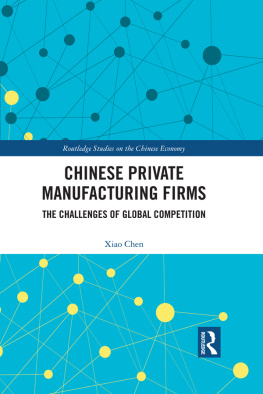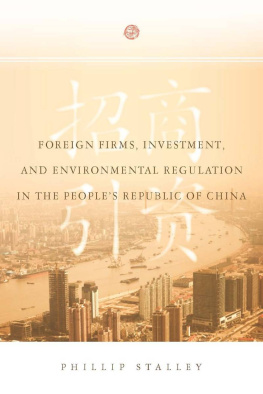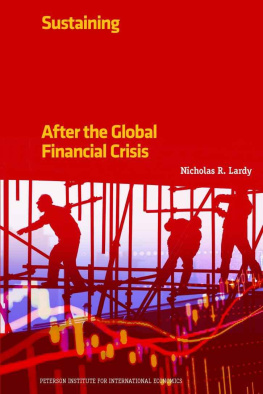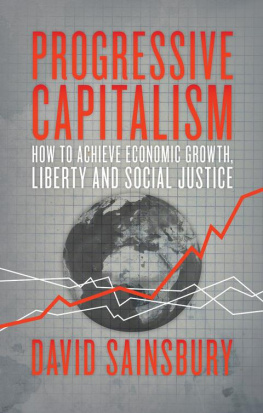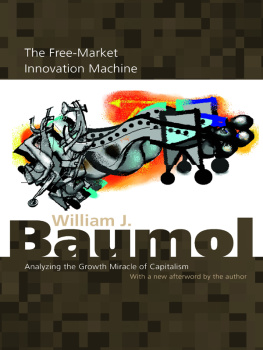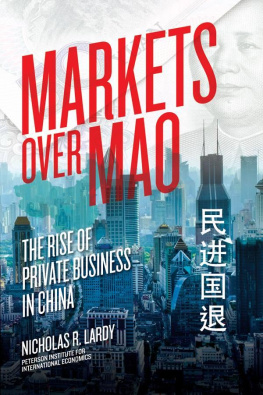WINDOWS OF OPPORTUNITY
WINDOWS
OF
OPPORTUNITY
HOW NATIONS CREATE WEALTH
DAVID SAINSBURY

First published in Great Britain in 2020 by
Profile Books Ltd
29 Cloth Fair
London EC1A 7JQ
www.profilebooks.com
Copyright David Sainsbury 2020
The moral right of the author has been asserted.
Cover images iStock
All rights reserved. Without limiting the rights under copyright reserved above, no part of this publication may be reproduced, stored or introduced into a retrieval system, or transmitted, in any form or by any means (electronic, mechanical, photocopying, recording or otherwise), without the prior written permission of both the copyright owner and the publisher of this book.
All reasonable efforts have been made to obtain copyright permissions where required. Any omissions and errors of attribution are unintentional and will, if notified in writing to the publisher, be corrected in future printings.
A CIP catalogue record for this book is available from the British Library.
ISBN: 9781788163842
eISBN: 9781782836339
To my wife Susie,
who has given me
unfailing encouragement and support
on the long intellectual journey
that has led to the writing of this book
Standard textbook economics fails to consider how differing windows of opportunity create huge variations in economic activities, and consequently also widely different opportunities for adding capital to labour in a potentially profitable way.
Erik Reinert, How Rich Countries Got Rich... and Why Poor
Countries Stay Poor
Contents
Acknowledgements
In writing this book I have benefited greatly from discussions with many people including Christopher Smallwood, John Kay, Keun Lee, Thomas Aubrey, Eoin OSullivan and Carlos Lopez-Gomez.
I would also like to recognise the part that the research and writing of Erik Reinert has played in the development of my ideas. In particular, his study of the history of economic thought stimulated much of the new thinking in this book. As John Maynard Keynes said, A study of the history of opinion is a necessary preliminary to the emancipation of the mind.
I have also received a great deal of support and encouragement from David Teece, the Professor of Global Business at the Walter A. Haas School of Business at the University of California, Berkeley. His work on the dynamic capabilities of firms has greatly influenced my approach, and is one of the reasons why this book should be of interest to entrepreneurs as well as economists and politicians.
I would like to thank Daniel Davies and Paul Forty for the immense help they gave me in preparing this book for publication. Finally I would like to thank my secretary, Tracy Mattinson, for enthusiastically typing the endless and largely indecipherable drafts of the book, and Joe Burns for making the whole process of writing and publishing this book a smooth and effective one.
Figures
Tables
Preface
We are faced today with a world of opportunity and danger. Developments in science and technology are creating windows of opportunity for firms to innovate, create new competitive advantages and grow. At the same time, the UK and other Western developed countries face major competition in global markets from countries such as China, South Korea and Taiwan, and as a result the prospect of periods of economic stagnation.
In such a situation, policy-makers need a theory of economic growth that explains why the growth rates of countries differ, and what they can do to improve the growth rates of their own economies. However, neoclassical economics, which has dominated economic thinking in recent years, has failed to produce such a theory. In this book, therefore, I have sought to develop a new theory and test it in the laboratory of history.
The new dynamic capability theory that I put forward explains I believe not only some of the puzzles of recent economic history, such as why the Asian Miracle took place ( what industry and governments in the G7 countries need to do to compete against China and other fast-growing Asian countries in a race to the top.
It also shows why a belief in neoclassical economic growth theory has led to governments adopting flawed economic growth policies in four areas. Firstly, the theorys failure to recognise the importance of innovation and competitive advantage in the economic growth process means that the need for policies to stimulate innovation has not been high on governments economic agendas.
Secondly, neoclassical economists have failed to understand that the windows of opportunity to innovate and create competitive advantage vary from sector to sector. As a result, the level of value-added per capita varies widely between different sectors of the economy, and therefore shifts of employment between sectors can slow down or speed up a countrys rate of economic growth. This means policy-makers have tended to adopt horizontal policies that apply equally to all sectors, rather than policies that seek to build the competitive advantages of firms in specific sectors.
Thirdly, most neoclassical economists, because of their emphasis on market exchange, continue to see firms as black boxes, not realising the need for governments to support the building of their capabilities or the reform of their governance.
Fourthly, because neoclassical economists do not understand that many of the high value-added per capita jobs in an economy are produced by manufacturing firms, they have tended not to see the decline of the manufacturing sectors of an economy, and their replacement by low value-added per capita service industries, as a major problem.
To show how the new theory I set out is different, I have compared it with the original theory of economic growth set out by Robert Solow. Though a number of economists have suggested major modifications and refinements to the original theory, no revised theory has clearly emerged to take the place of the original theory. Equally, none of the revised versions deal fully with what seem to me to be the weaknesses of the original theory. A comparison of the two theories therefore seems the simplest and best way to explain the differences between them, even though very few economists today would probably fully support the original theory.
From my ringside seat in industry and government I have watched the failure of policy-makers and politicians to understand what is happening in their economies, along with their failure to develop effective policies to increase their growth rates. Where possible, I have sought to play a part in developing the policies that are needed. As a result, this book is firmly based on my experience of how firms innovate and create competitive advantage, and what governments can do to help them.
While, for example, I was Minister of Science and Innovation between 1998 and 2006, in what was then called the Department of Trade and Industry, I sought to improve the national system of innovation, and to increase the resources allocated to science and technology. What I managed to achieve while I was in government is set out, as an example of what can be done, in .
In 2007, after I left government, I was asked by the then Prime Minister Gordon Brown to produce a report on the science and innovation policies of the government. He asked that I look in particular at the role science and innovation can play in enabling a country such as the UK to compete against low-wage, emerging economies such as China and India.
Next page

